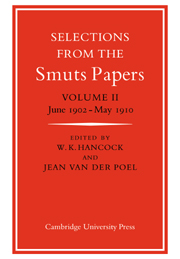Documents 274–338
Published online by Cambridge University Press: 03 February 2010
Summary
The period opens with Smuts's departure for England at the end of 1905 to urge upon the new Liberal Government the wisdom of granting responsible government to the Transvaal and the Orange River Colony without delay. He took with him a supporting memorandum (277). His talks with the Liberal leaders, and the details of this mission, which he always regarded as the most successful and important of his life, are not recorded in his papers. This English visit was significant for another reason—it saw the beginning of his close and life-long friendship with the Clark family of Street in Somerset, which is recorded in the most valuable series of letters in the Smuts Collection. The opening letter of the series (279) was written to Margaret Clark (M. C. Gillett), who had worked with Emily Hobhouse in South Africa and been a fellow-passenger on the voyage to England.
The letters of 1906 record the increasing tempo of Smuts's political life. It was chiefly concerned with the fight against Chinese labour and the all-important question of what the basis of representation under responsible government should be. This last involved a number of conflicts—town against country, Dutch against English, blacks against whites. These matters are discussed with animation in the contemporary correspondence of Smuts and Merriman. There was enough common ground and enough difference between them to make these exchanges fascinating to any student of South African history.
- Type
- Chapter
- Information
- Selections from the Smuts Papers , pp. 205 - 328Publisher: Cambridge University PressPrint publication year: 1966



